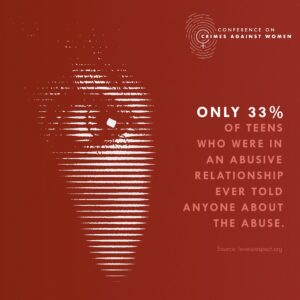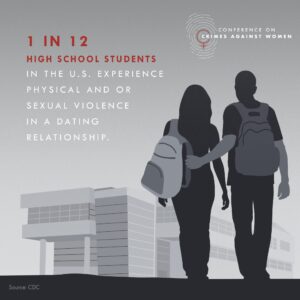*Resources below*
Teen dating violence encompasses physical, emotional, psychological, and even digital abuse between individuals in a romantic relationship during adolescence. It can manifest as controlling behaviors, verbal insults, threats, or physical harm, and it often begins subtly before escalating. Because these behaviors may be normalized or hidden in early relationships, recognizing the warning signs is essential for intervention and prevention.
The consequences of teen dating violence extend well beyond the immediate pain of an abusive incident, affecting every aspect of a young person’s life:
Mental and Emotional Health
Adolescents who experience dating violence often carry deep emotional scars that can persist into adulthood. The abuse frequently leads to mental health challenges, such as depression, anxiety, and post-traumatic stress, undermining self-esteem and the ability to trust others. This chronic stress can also pave the way for dangerous outcomes like suicidal thoughts or behaviors. Moreover, constant exposure to such harmful dynamics disrupts normal emotional development, making it difficult for victims to form healthy relationships later in life.
Academic and Cognitive Challenges
The impact of dating violence is not confined to emotional health—it also affects academic performance and cognitive abilities. The stress and anxiety that accompany an abusive relationship can disrupt a teen’s concentration and hinder learning, often resulting in lower grades and higher absenteeism. Over time, the cumulative effects of stress can impair critical thinking and decision-making skills, potentially leading to increased dropout rates and limited future opportunities.
Social Isolation and the Cycle of Violence
Abusive relationships can erode a teen’s social connections and sense of belonging. Victims might withdraw from friends, extracurricular activities, and family life, deepening feelings of isolation and loneliness. This social withdrawal often creates a vicious cycle: without a strong support network, teens may feel trapped in unhealthy patterns, inadvertently normalizing abusive behavior. Unfortunately, this normalization can lead to a cycle of violence that extends into adulthood and even across generations.
At CCAW, we are committed to raising awareness, providing valuable resources, and advocating for policy changes that protect not just woman, but our youth. By focusing on early education and empowerment, we strive to break the cycle of abuse and help teens develop the self-respect and resilience necessary for healthy relationships.
This May, we are excited to host our annual conference dedicated to confronting violence against women head-on. This event will gather educators, mental health professionals, and advocates to share insights, best practices, and strategies for prevention and intervention. Attending the conference will not only give you access to cutting-edge research and practical tools but also connect you with a community of passionate individuals dedicated to creating safer, healthier environments for our women and youth.
REGISTER HERE
Take action today and help us pave the way for a future where every young person feels safe and empowered in their relationships.
Resources from CCAW programs on Teen Dating Violence:
Click each title to access the resource.
CCAW Workshops on Teen Dating Violence
All of these workshops will be available to attend at the upcoming 2025 Conference on Crimes Against Women:
-
Building Collaborative Partnerships to Prevent Teen Dating Violence in Rural Communities
In rural communities, preventing teen dating violence requires intentional, collaborative efforts that bridge gaps in resources and education. Through shared responsibility and evidence-based strategies, practitioners can prevent violence before it starts and cultivate a culture of respect and equality for the next generation. This workshop will explore how schools, community organizations, and leaders can work together to educate young people about healthy and unhealthy relationship behaviors, with the ultimate goal of reducing the continuum of violence.
-
One Size Doesn’t Fit All: Cultural Considerations when Working with African American Youth Survivors of Sex Trafficking
NTC Trainings:
Click the title to learn more about the training.
The National Training Center is partnering with local school counselors and social workers to train on signs of teen dating violence and how to intervene. This training is a closed event hosted by Region 10.
ICCR Webinars:
Click the title to watch the webinar.
Presented by D Dagondon Tiegs, Bilingual Social Change Associate, ICASDV and Jessica Moreno, LCSW, Managing Partner at Collective Capacity Consulting, LLC.
Presented by Kaiti Dinges, Jana’s Campaign.
PCAW Episodes:
Click the title to listen to the episode.
Discover the alarming truth about teen dating violence with Katie Blackburn, executive director of Jana’s Campaign, as she shares powerful insights and strategies to combat this pervasive issue. Through the tragic story of Jana Mackey, whose advocacy ignited a movement, Katie outlines how education is key to preventing relationship violence among teens. Get ready to learn how understanding and recognizing early warning signs can empower young people to foster healthy, respectful relationships.
Explore the often-hidden world of emotional abuse in teen relationships, where manipulation and love bombing are more than just buzzwords—they’re dangerous patterns that can have lasting impacts. Our conversation sheds light on how early education around consent, boundaries, and healthy communication can disrupt the generational cycle of violence. Katie passionately emphasizes the importance of teaching teens to recognize and reject these harmful behaviors before they can take root.
Technology plays a dual role in teen relationships, offering both connection and potential for harm. Hear how social media platforms like Instagram and TikTok influence teens’ interactions, sometimes facilitating abuse through blurred boundaries and cyberbullying. We dive into the critical role adults must play in shaping safe environments and policies, fostering open dialogues about digital safety and respectful relationships. Tune in to understand how comprehensive education and community involvement are crucial in breaking the silence and building a culture that stands firmly against abuse.
Domestic violence affects 1-in-3 women in the United States. While we have come to understand that forms of intimate partner violence can range from the physical to the lesser recognized forms of verbal, financial, and spiritual abuse, the impact of any form of domestic violence on children in the household is sometimes overlooked. Today we discuss that impact, specifically among teens, and how domestic violence can disrupt their home life, physical, and cognitive development.
Our guest today is Jordyn Lawson, senior director of Residential Services at Genesis Women’s Shelter & Support. Ms. Lawson supervises both the emergency shelter and Annie’s House transitional living program at the organization and has worked in the field of domestic violence and trauma recovery for over 12 years, conducting individual and group counseling services for women, adolescents, and children. She has a passion for ending domestic violence and helping those who have experienced the pain of trauma heal and grow.
Content warnings for this episode include: physical and emotional abuse.
Resources from the Resource Library:
Click each title to view the document/resource.
This paper focuses on help-seeking barriers and factors impacting decisions to leave an abusive relationship among 15 immigrant African women. Barriers found in this study include a culture of gender inequality, acceptance of gender violence, concern for children, and self-blame.
This study comments on the perceived effectiveness of protective orders among black, hispanic, and white women. The results show significant decreases in threats of assault, stalking, and worksite harassment over time among all women, regardless of receipt of a protection order.
This toolkit collects some of the most successful strategies, and tools for engaging communities of color, here defined as people of African, Latino or Hispanic, Native American, Asian, or Pacific Island descent.
This toolkit collects some of the most successful strategies, and tools for engaging communities of color, here defined as people of African, Latino or Hispanic, Native American, Asian, or Pacific Island descent.
National Resources:
Click each title to view the document/resource.
A project of the National Domestic Violence Hotline, love is respect offers 24/7 information, support, and advocacy to young people between the ages of 13 and 26 who have questions or concerns about their romantic relationships. They also provide support to concerned friends and family members, teachers, counselors, and other service providers through the same free and confidential services via phone, text, and live chat.
They aim to be a safe and inclusive space for young people to access help and information in a setting specifically for them. They provide comprehensive education through resources including quizzes, interactive pages, and testimonials, as well as training, toolkits, and curriculum for educators, peers, and parents to promote healthy relationships and prevent future abuse.
All relationships exist on a spectrum from healthy to abusive, with unhealthy relationships somewhere in the middle. Explore Love is Respect’s interactive Relationship Spectrum by rating different scenarios as healthy, unhealthy, or abusive and find out where your own relationship falls.
One Love Foundation is a national non-profit organization with the goal of ending relationship abuse. They empower young people with the tools and resources they need to see the signs of healthy and unhealthy relationships and bring life-saving prevention education to their communities.





